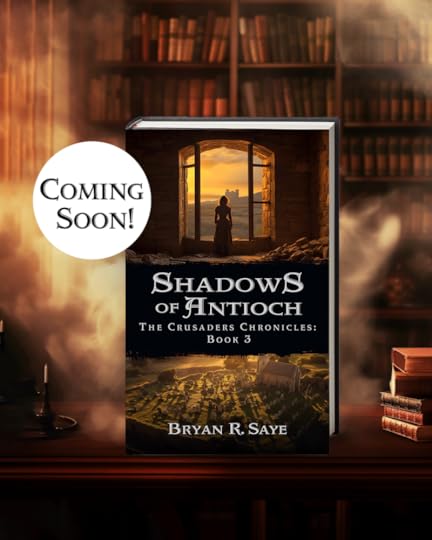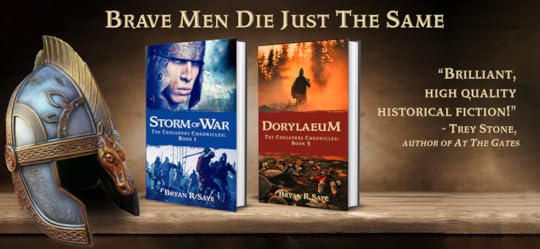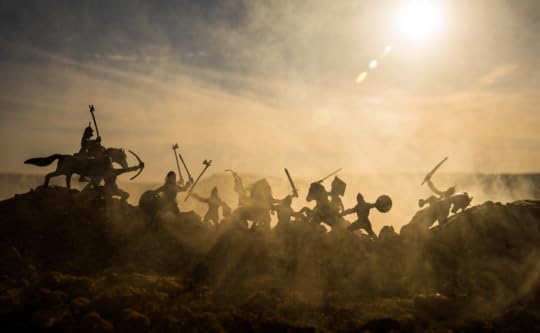Bryan R. Saye's Blog, page 2
July 8, 2024
Marie's Story - Chapter 2
You voted, and here's the second chapter of our book together.

Remember to scroll down to see this week's polls and make your voice heard for the next chapter!
Enough talk. Let's get to reading.
Gusan, FranceSeptember 1413Marie ignored the rapid rise in her heart rate and wiped away the sweat beading her forehead. She gave what she hoped was a nonchalant shrug.
“I see men every day,” she said casually, though she felt Joanna’s nervous stare from across the hall. “You’ll need to be more specific.”
The cloaked man bared his teeth in a wide smile. It was a predatory smile, nothing joyful about it, and a shiver ran down Marie’s spine. “You would know him,” he said. “He’s not from Gusan.” He glanced at the faces of the men in the hall. “Being a woman owning an inn by yourself, I suspect you’ve already ‘met’ most of the men of your quaint town. More than once, I’d wager.”
“Watch it,” Humbert interrupted sternly. He’d caught the cloaked man’s implications. Judging by the indignant murmurs among the others, he wasn’t the only one. “You can’t walk in here and speak to Marie like that.”
He scoffed, though a quick survey of the hall made him realize he was quickly losing the room. He seemed to know he’d need their assistance to find the man he was after.
The man tied to a bed upstairs, Marie thought.
“Let me apologize,” the cloaked man said. “I feel we’ve gotten off on the wrong foot. My name is Rupert, and I am an emissary of King John.” He raised his hands in protest to the immediate chorus of curses that followed the mention of the English king. “I have no love of him, either,” he quickly added. “But he has hired me for a job. I harbor no ill will for France or its people. I come not in malice or aggression but only to retrieve a man. This man is a thief and a killer, and John would see him dead. I am merely his instrument.” Rupert held an open hand toward one of the two guards he’d brought. The guard dropped a pouch into his palm. “I have a reward for any information. They’re English shillings, but I wager you’ll find it easy enough to spend.”
“It doesn’t matter,” Father Clement said before anyone else could respond. He rose from his table and stepped toward Rupert. “There’s been no strange man in Gusan.”
“Do you speak for everyone?”
“He does,” Humbert replied. “We’re a small town, and we see few travelers.” He gestured to the others inside the hall. “Even now, this inn is filled with our townsfolk.”
Rupert turned to Marie. “What about you, innkeeper? Have you seen this man?” He shook the pouch of coins. “I imagine this would go far to improve your inn.”
Marie swallowed. She once again felt Joanna’s gaze. The mezzanine above seemed to call her attention, and she struggled not to turn her gaze toward the door where the injured man lay tied up. A part of her wanted to admit she housed him. After all, what did she owe this man? She’d cared for his injury and even provided him a place to recover. Should she sacrifice a reward for his safety?
Yet Marie was stubborn. She suddenly desired to keep the injured man safe, though she couldn’t say why. If nothing else, Rupert’s judging gaze and arrogant demeanor were enough for her to deny him, not to mention he was English.
She didn’t trust him.
“I’ve seen no man,” she finally said. She waved a hand at those in her hall. “These are the only men I know. The men of Gusan.”
Rupert didn’t reply right away. He passed the pouch back to the guard, though he kept his gaze on Marie. “You wouldn’t mind if I examined your rooms, then,” he said. “Would you?”
“I would,” she replied, putting as much mock indignation into her voice as possible. “Men who stay here pay for their comfort and privacy. I’ll not have you rob them of both.”
He scoffed and looked at the mezzanine. “I see three rooms,” he said, “and I doubt you have enough customers to fill two.” In truth, she had no customers at all, only the unconscious man that Rupert sought. “I shall be quick,” he added.
“You shall not,” she insisted.
Rupert worked his tongue in his mouth and looked again about the hall. Marie could see him weighing his next move. There were enough of Gusan’s men—and women—in the hall to put up a fight should he decide he wanted one. Yet, aside from a few daggers and Gosse’s bludgeon that he insisted on carrying, they had no real weapons. Rupert’s guards were clad in cuirasses and mail and had swords strapped to their belts. She suspected Rupert himself had a weapon on him somewhere. There would be blood—and lots of it—if Rupert insisted on searching the rooms without her permission. He seemed to realize this, though he also seemed to recognize that slaughtering a village of innocents on the off-chance they hid his target was a poor decision.
“Very well,” he finally said. Though his voice remained poised and calm, she saw the tension in his face. He didn’t like giving up, and Marie could tell he suspected she was lying. What he would do with that suspicion remained to be seen. “You will keep an eye out, won’t you?”
“Of course,” she lied.
“Very well,” he said again. With another condescending sweep of the hall, he and his men turned and left.
“What an odd man,” Humbert muttered, and that seemed the end of it. “Come on, John. Let’s have some music.”
The gittern sprang back to life, and the men and women of Gusan quickly forgot about Rupert and his thugs. After all, to their minds, the danger was passed. Marie spared a glance at Joanna and saw her sister sweating profusely. Marie gave a wink, hoping to express a calm she didn’t quite feel herself, and then the two girls returned to serving food and drinks as the night wore on.
Roul departed first—an odd occurrence, but not an unwelcome one—and one by one, the others followed until Marie and Joanna were left sweeping up the hall with Gosse and Melisendre the only other occupants. They were finishing up what could easily be their twentieth game of chess. Eventually, even they packed up and left, and it was then that Marie finally decided to return to the mezzanine and pay a visit to their only guest.
“I want to come,” Joanna insisted.
“No,” Marie said. “We don’t know if he’s dangerous. We don’t know—”
“If he’s dangerous, you should have given him to that man.”
“That man felt more dangerous than anyone I’ve ever met,” Marie said. “Now stay down here, keep sweeping, and go to bed when you finish.”
Joanna huffed, but she obeyed, and soon Marie found herself standing outside the man’s room. Her heart thumped in her chest, and her palms became slick with sweat as she placed a hand on the door. Below, she heard the gentle scraping of Joanna’s sweeping. The hall was dark except for a single sconce over the barred entrance, and dancing shadows flickered as her sister dragged the straw broom around the hall.
She drew a breath and entered the room, half-expecting the injured man to jump her as she did. Instead, she found him still lying on the bed, his chest rising and falling with each shallow breath. She shut the door, lit a rush candle, and sat in the corner of the room. For a moment, she sat quietly and watched him breathe.
“What does it go to?” she suddenly asked.
The man stirred, and she knew her guess had been correct: he wasn’t sleeping. “What does what go to?” he asked without opening his eyes.
“They key in your pouch.”
He lifted his head and looked at her across the room. “Where am I?”
“My inn,” she answered. “What does it go to?”
“Who said you could go through my stuff?”
“I earned the right when I saved your life,” she answered.
He sat up, though it was an awkward move with his wrists still bound behind him. He winced as his stitches likely tugged at him. The ropes at his ankles pulled tight as he sat. “Can you untie me?”
“When you answer my question.”
He frowned, and even that felt more joyful than Rupert’s smile. “A box,” he said. “What inn? What town?”
“The Blue Lily,” she said. “In Gusan. What box?”
He shook his head and looked at the floor. He seemed to be thinking. “Gusan…” he muttered. “How’d I get to Gusan?”
“What box?”
“It doesn’t matter,” he said. He sounded irritated, as if she was inconveniencing him. He glanced at his belt hanging on the wall. “Where’s my sword?”
“You didn’t have one. Why doesn’t it matter?”
“Is the key safe?”
“I left it in your pouch.” She sat back and sighed. “At least tell me your name?”
“Guiscard.”
“And are you a thief and killer, Guiscard?”
“Why would you ask me that?”
“Someone claimed you were.”
He scoffed. “You’ve spoken with Rupert. That man has stolen and killed far more than me.”
“But you have stolen and killed?”
“Only when I’ve had to,” he said, though she doubted it was entirely true. He turned and showed her his bound hands behind his back. “Can you untie me? Please?”
“Not yet,” she said. “Why did you stumble from the woods this afternoon? Why do you have a key in your pouch that goes to some mystery box? Why is a man threatening and bribing people to find you?”
Rather than answer any of the questions or even appear threatened or put off by them, Guiscard smiled. “You’re feisty,” he said, turning again so his hands were behind him. “I like that.”
“I’m glad,” she said. “Answer my questions, or I’ll find Rupert and take his money.”
“How much?”
“He didn’t say.”
“Probably not a lot.”
“Answer my questions.”
“Which one?”
“All of them.”
“You get one.”
She scoffed. “You’re tied up. You’re injured and in my care. I get as many questions as I like.”
“That’s only half true.” He held his hands out in front of him. His wrists were no longer bound, and the rope hung in one hand. “I’m not tied up.”
Marie leaped to her feet, nearly dropping the candle.
“Relax,” he said, holding his hands out before him. “I’m not going to hurt you. Sit back down before you torch your inn.”
She sat, though she found herself clutching the rush candle.
“I’ll answer one question as a thank you for patching me up,” he said. He leaned over and started to untie his ankles.
“Why is Rupert after you?” she blurted out.
“Because of the key I stole from King John,” he said.
“So Rupert was telling the truth?”
Guiscard untangled the rope from his feet and tossed it on the floor. “Depends on what he said.”
“That King John hired him to kill you.”
“Then yes,” he said, “he’s telling the truth.” He stood up and stretched, then winced at his stitches. “Damn,” he muttered, lifting his mail and touching his side gently. With the mail pulled up, Marie saw the bandage was still clean. Either the wound wasn’t as bad as it looked, or she’d done a better job with her stitches than she initially thought. “Why’d you help me, anyway?”
“Why wouldn’t I?”
He shrugged and took his belt off the wall. “Same reason you should’ve taken the money.” He buckled his belt around his waist. “You don’t know me.”
“So I should just let you die?”
“Maybe.”
Guiscard left the room, and Marie followed. “Where are you going?”
“Away from here.”
“Why?”
They descended the stairs to the now-darkened hall. Marie saw no sign of her sister. Joanna must have finished cleaning and went to bed, though Marie doubted she was asleep. At least she’d remembered to put out the sconce above the door.
“Because Rupert’s looking for me. He can’t get the key.”
“What’s so special about the key?”
“It’s not the key that’s special. It’s the box it opens.” Guiscard surveyed the hall and spotted the barred front door. “You don’t trust Rupert, do you?”
“I don’t trust many people,” she replied. “What’s in the box?”
“I already answered your one question.” He turned toward the back door. “You have any food you’re willing to part with?”
“Not for people who refuse to answer more than one question.”
He grinned. “Fair enough.” He stuck out his hand. “Thank you again. Goodbye…” he trailed off. “I don’t know your name.”
“You don’t need to.” She didn’t take his hand.
“You’re right, I suppose.” He kept his hand out for another moment before turning and leaving through the back door. It was barred, as well, though it took little effort for him to remove the wooden board. “Is that a donkey?” he asked from outside.
Marie ran through the open door. “Do not touch Isabeau,” she nearly shouted as she stepped into the cool night. There were no clouds, and a sky full of sparkling stars and a brilliant half-moon illuminated the patch of grass behind the Blue Lily. She extinguished the rush candle and set it down in the wet grass. “You can’t take her.”
“Fine,” he muttered. “I won’t.”
“Where are you going?”
“You already asked me that,” he said. He scanned the back of the inn, looked at the same trees he’d stumbled from only hours ago, and eventually let his eyes fall on the axe still embedded in the tree trunk.
“That’s mine,” she said preemptively.
“I need a weapon,” he countered, walking toward it. “You won’t give me food or a mount; at least let me take a weapon.”
She followed. “That’s mine,” she said again, and their hands grabbed the axe at the same moment. “You can’t take it.”
“I’ll bring it back.”
“Liar.”
“Did you drop the candle?” he asked suddenly.
“What? No.” She glanced back at the extinguished candle in the grass. “Why?”
He pointed to one of the Blue Lily’s second-story windows. Orange light flickered in the darkness. A thin tendril of coal-black smoke drifted into the clear night sky. Even as they watched, another of the windows lit up.
The Blue Lily was on fire.
“Mon Dieu,” she gasped.
“Mon Dieu, indeed,” he said.
July 5, 2024
Lessons I (Kind Of) Learned at Air Force Basic Training
I went through Air Force Basic Training almost fifteen years ago. It's technically called BMT (Basic Military Training), and we had TIs (Training Instructors) instead of Drill Sergeants. I'll pause here so anyone who's gone through Army or Marine Boot Camp can take the time to mock me a little.
Yes, my training was shorter and easier.
Yes, we skipped the water components of the obstacle course because "it's too cold outside."
Yes, we once got bussed back to our dorms because the hot water was out at the location where we were supposed to do some field exercises.
And yes, we had bathrooms and showers adjacent to our field exercises.
But you know what? Water's cold and field exercises are lame.Now that I think about it, you Army and Marine guys can mock me a lot instead of just a little. Don't worry, I can take it. The flight line gave me thick skin.
As (comparatively) easy as it was, I still (kind of) learned some (maybe) valuable lessons that I'd like to share.
Lesson 1: It (Probably) Doesn't MatterWe worried about so much nonsense at basic training. We got yelled at if our clothes weren't folded or rolled up right, or if our beds' corners weren't made nice and tight. We got threatened with being "recycled" almost daily, which meant we'd be forced to repeat entire weeks of training.
It was all nonsense.
Sure, if we messed up badly enough, we'd get sent back in training and forced to do it over again. But guess what? No one did. And the little things we were so focused on? They got figured out.
Eventually.

And yes, I still roll my clothes up when I travel. You can fit so many pairs of undies in your suitcase that way. Who doesn't need more undies on vacation? Look at all that wasted space!
The point is this: whatever you're worrying about most likely doesn't matter. Sure, sometimes it does, like when a loved one is sick, or the money doesn't quite make it to the end of the month. But I'd wager that 85% of what you're worrying about right now isn't at that level.
Lesson 2: Don't Poop Your Pants. Just Don't.Okay, this lesson might seem obvious, and maybe I shouldn't have had to learn it from the Air Force, but I've only ever seen a grown man poop his pants twice in my life, and both were at basic training. Just don't do it. Go poop in the bathroom like a regular person. Also, don't challenge someone to punch you in the stomach because you're bored (especially when you have diarrhea).You'll probably poop your pants.
On that note, click here if you want a good laugh. Shayne Smith is the best.
Lesson 3: Basic Training Dust Downs!Ever dusted a dorm room with a flip-flop? Quite possibly the most ridiculous thing I've ever done. Every morning, our entire training class would be down on our hands and knees, pushing the dirt and dust from the ground into the center aisle between our bunks. Then, one of us would crawl down that center aisle, pushing all the accumulated dirt and dust out of the dorm. We'd end up with an enormous pile of dust.
Every day!
Where did it come from? No idea. I still think the instructors planted it there when we slept. It probably didn't help that our blankets were essentially made of dust. Now that I think about it, I'm not sure what lesson I learned from dust downs...
Lesson 4: To Make or To Not Make Your Bed, That is the QuestionOkay, so this one is up in the air. This guy says don't make your bed, and this guy says make it. We didn't get a choice in basic training. We made that sucker, and we tucked those corners in so tight you could bounce a quarter on it.
Sort of.
You know what most of us actually did? We pop-tarted it. I'll wait another minute for those who went through basic training to have a good laugh.
What's pop-tarting your bed? That's when you don't unmake it at night. You just wiggle into your nicely made bed and sleep at attention so you don't mess up those tight corners. In the morning, you wiggle out and give it a little courtesy tuck.
So, do I make my bed now?
No. I refuse. Also, my wife's still asleep when I get up at 5. She might take offense if I wake her up to make the bed.

Then what did I learn? What's the lesson?
Do something as soon as you wake up. If making your bed is that something, go for it. If it's stretching, go for it. If it's a quick walk or a workout, go for it. If it's prayer, go for it (though you should probably do that every morning regardless). Doing something right away is good for you.
Get out of bed and go do something.
Lesson 5: Don't Send Cookies to Your Loved at Basic Training (Or Do, If You Want a Good Laugh)Yes, this happened. Someone's parents mailed them a box of cookies. Our instructors got a good laugh out of it and then ate the cookies in front of us. If your kid ends up joining the military, don't send them cookies.
Or do. Just put a laxative in them or something.
Lesson 6: It EndsYep, here's the big one. It might not shock you, but it shocked me: Basic Training ended. Can you believe it? Eight-and-a-half weeks blew by like a long weekend. Each day felt like a week, but each week felt like a day. Does that make sense? The moments dragged, but looking back at the moments makes you feel like they happened so fast.
Whatever crap you're going through will end. I promise.
But it goes both ways. My kids are teenagers, but I still remember wiping their little heinies. I've been married for almost nineteen years. When my mother turned forty, I bought her a magnet that said, "I'm not 40; I'm 39.99."
Guess how old I'll be in December? Yep. 40.
Gross...
Time flies. Whatever you're going through is going to end.
Enjoy it.
July 1, 2024
Marie's Story - Chapter 1

You voted, and here's the first chapter of our book together.
Remember to scroll down to see this week's polls and make your voice heard for the next chapter that will be posted on July 8th.
Enough talk. Let's get to reading.
Gusan, FranceSeptember 1413Marie struggled to push the door open with a hip as she tried to squeeze her way into the hall of the Blue Lily. Her arms were so overloaded with recently cut logs that she barely fit through the doorway. A square hearth sat cold in the hall’s center with a massive uncooked leg of lamb hanging on the spit above it. She staggered around a trio of wobbly wooden tables—each with a pair of equally wobbly wooden benches—and nearly fell against the brick-lined hearth as she dropped the logs into it with a heavy sigh.
“Thank you,” she said sarcastically, throwing a frown at Roul sitting in the corner of the inn. “I didn’t need any help.”
Roul was the only customer in the Blue Lily this early in the afternoon, and he watched her with a leering smile as he sipped his mug of ale. His eyes lingered on her longer than she liked. “You’re a strong lass,” he replied. “You didn’t need me.”
She dusted wood chips off her apron and tugged at her simple calf-length brown dress. She hated Roul, but he paid on time and drank enough to almost single-handedly keep the Blue Lily in business. Since her father’s death last winter, she ran the inn essentially alone, which was uncommon for an unwed twenty-two-year-old woman. She was in no position to turn anyone away. Aside from the extra attention he paid her, he wasn’t any real trouble.
Just a nuisance, she thought. And a creep.
“I can help.”
Marie turned to her eight-year-old sister, Joanna, who sat atop the bar at the back of the inn with crossed legs. She picked at her dirty fingernails as she watched Marie at the hearth.
“I can light the fire,” she offered.
“I’m sure you can,” Marie replied as she dug the flint and steel from a pocket in her apron.
“Don’t you have to feed Isabeau?”
“Why don’t you feed her?”
“I can’t lift the fodder,” Joanna said. “The pitchfork’s too big. But I can start the fire. Promise!”
Marie frowned at her sister.
“I’m not a baby,” she persisted. “I’ve done it before.”
“When?”
Joanne looked down suddenly. “Never mind.”
“Let the lass do it,” Roul put in.
Marie turned to him. “The only advice I’ll take from you is how much to water down the ale.”
He frowned and looked at his mug. “It’s watered down?”
She gave a noncommital shrug, grabbed a handful of tinder and kindling, and dropped it atop the logs. She started to light it, then sighed and turned to her sister. “Come on…”
Joanna beamed and leaped down from the bar. She snatched the flint and steel and struck the kindling, and the spark caught almost immediately as a low fire started. Joanna bent over the bricks and blew into the fire. The logs caught a moment later, and she smiled up at Marie.
“Thank you for your help,” Marie said. “Now watch that Roul doesn’t sneak any more ale while I feed the horses.”
“I didn’t sneak any!” he lied from his corner.
The two girls ignored him as Joanna retreated to her seat on the bar and began picking again at her fingernails.
“And watch the lamb,” Marie added as she opened the rear door again. “Make sure you’re turning it. Father Clement’ll be sure to let you know if you burn it.”
“Father Clement is a stuffy old man,” Joanna whined.
“That may be true,” Marie agreed, “but he’s a kind stuffy old man.”
Father Clement had said the mass at their father’s funeral, and he’d helped support the Blue Lily for a short time afterward by donating food and even running it a few nights Marie hadn’t been able to. That’d been quite the sight: a priest pouring ale for travelers. They owed a great deal to Father Clement, so Marie believed he was entitled to be a bit particular about his food.
Marie stepped outside to where Isabeau waited in the stable. Isabeau was an aging donkey, though she was sturdier than she looked and had served them well for almost ten years. Marie filled her trough with hay, then continued preparing the inn for the rush she knew would be coming.
Gusan was a small hamlet, and there was little for the townsfolk to do besides eat and drink at the Blue Lily and complain about King Phillipe Augustus, though even Marie knew the king was a good one. Everyone chipped in to ensure that Marie and Joanna could provide the Saturday evening meals that had become a custom in Gusan. The lamb had been a gift from Humbert, Gusan’s only shepherd. The fruits and vegetables came from Killian’s farm. Father Clement himself provided an extra cask of ale or wine most Saturdays.
An hour later, Marie returned inside and found Roul sleeping in the corner. Joanna leaped down from the bar and rushed over the hearth, rotating the lamb for what was probably the first time. Marie frowned at her sister, then took the remainder of Roul’s ale and poured it into the cask behind the bar. She placed the empty mug back into the drunkard’s hand.
“If he asks, tell him he finished it,” Marie said, and Joanna flashed her a smile.
“Fire’s getting low,” Joanna said. “Can I chop some more wood?”
“If the pitchfork is too heavy, the axe is too heavy. Keep tending the fire. I’ll be back in a minute.”
The Blue Lily had been built at the edge of a dense forest of oak and birch. The trunk of a broad oak sat in the shade of the forest with an axe embedded in its surface. A fallen pair of birch trees rested in the grass beside the trunk. Marie grabbed the axe—the same axe she’d used that morning—and pulled to no avail; it remained deep in the wood. She eventually had to stand atop the trunk and grab the axe shaft with both hands to finally pry it free.
“Should make Roul chop wood,” she muttered, dragging the heavy axe toward the fallen birch trees. She wrestled the blade atop the wood. “Then maybe he’d drink less. That old son of a—”
She heard footsteps from the forest and spun, holding the axe in front of her like a weapon. It shook from the weight and dipped almost immediately into the grass as a man stumbled out of the shadows, clutching his side. He met Marie’s tense gaze and then collapsed into the high grass.
At first, she didn’t move. Rarely—if ever—did she see anyone back here. The light from the fading hearth flickered from the still-open backdoor of the Blue Lily, though she doubted Joanna could see them. She turned cautiously back to the injured man.
“Hello…”
No response.
“Monsieur…” she stammered. “Are you…” she trailed off. Please don’t be dead, she thought.
She stepped to his unmoving body with the axe dragging behind her. He lay face-first on the grass. Kneeling, she placed a palm on his back and felt his mostly steady breathing. At least he was alive. Her hand came back slick and red, and she noticed a smear of blood at the man’s side. He wore a faded leather vest, a dirty hood, and an equally dirty pair of fabric pants. An empty scabbard of plain brown wood and a meager leather pouch hung on his belt.
“What’s that?”
Marie spun to find Joanna standing nearby. When her little sister saw the man, her eyes went wide. She looked at Marie’s axe and bloodied hand.
“What did you do?”
“Nothing!” Marie shouted. She dropped the axe. “He just stumbled from the woods.”
Joanna walked around her and continued to stare down at the unconscious man. “What happened?”
“I don’t know.” She brushed her bloodied hand on the man’s dirty hood, though it did little to clean it. “Why are you out here?”
“You took too long. What do we do with him?”
“I don’t know. Get away from him,” she added.
Joanna didn’t move. “Why? Is he sick?”
“I don’t know,” she said for the third time.
“You can’t just let him die,” she went on.
“I know. Back up,” Marie insisted, pushing Joanna back this time.
“Eww! You got blood on me.”
“Joanna, go back inside. I need—”
“I want to help!”
Marie gave a frustrated groan. “There are bandages inside. In our room, under the bed. Grab them. And get my sewing kit and some honey.”
“Honey?”
“Yes, honey,” she said. “Now go!”
Joanna turned and ran inside. Marie bent down again and watched the man breathe. Underneath his vest, he wore a faded set of mail armor. She knew little of armor and arms, but even she could tell that the man’s mail was poorly taken care of; the rings were rusted, and many along the fringes were even broken or fractured. She tried to turn him over, but he was too heavy.
“Here!”
Joanna skidded to her knees in the grass beside Marie. She held a handful of linen bandages in a bundle in her arms, along with a leather pouch and a small jar of honey.
“Help me turn him over,” Marie said.
Joanna dropped the items, and the two rolled the man onto his back. He groaned as they did, but his eyes remained shut. Marie unbuttoned the vest, and Joanna saw the mail armor for the first time.
“Is he a soldier?”
Marie didn’t answer. Unlike the vest, the mail wasn’t buttoned up the middle, meaning she’d have to pull it over his head to remove it. Instead, she shimmied it and the shirt underneath up and out of the way to see the wound. It looked like a clean cut, though she suspected it hadn’t been an accident. Blood seeped through and began to pool on the ground beside them.
“Mon dieu,” Joanna muttered.
“Hush. Get me some water.”
Joanna ran off again as Marie placed some bandages over the wound. They immediately soaked through. She held them in place until Joanna returned with the water. Soaking more bandages, she wiped the wound clean before smearing it with honey. The man groaned as she began to stitch the wound closed, though he didn’t open his eyes as Marie finished the rough stitches. Even she frowned at her work when she was done.
A few minutes later, they had the bandages wrapped tight about his abdomen, an extra layer packed over the wound.
“We have to get him inside,” Marie said. “Father Clement’ll know what to do next. Come on.”
The man’s hand shot up suddenly and grabbed Marie’s wrist. She tried to jerk back, but his firm grip held her in place as he met her gaze with fierce green eyes. “N-no,” he whispered. “Get no one…I…I can’t…trust…” he trailed off into a fit of coughing. He patted at a pouch on his belt. “Keep it…safe…Keep it…away from…them…”
His lids fluttered, then closed, and he fell limp once more.
“What did he say?” Joanna asked.
Marie didn’t answer. Her eyes were on the man’s pouch.
“What did he say?” she asked again.
“To get no one.”
“What does that mean?”
“I don’t know.”
“You think he’s a bandit or something?”
Marie bent down and opened the leather flap of his pouch. She looked inside before cinching it back shut. “Come on,” she said quickly, grabbing him under the arms. “Let’s at least get him upstairs.”
They dragged him across the grass—Isabeau watched them with interest—and through the open back door. Roul still snored away in the corner. They wrestled the unconscious man up the stairs to the mezzanine and into one of the Blue Lily’s rooms, closing the door behind them before hauling him up onto a bed.
“What now?” Joanna asked. “Do we call Father Clement?”
Marie didn’t know how to answer. He’d said to call no one. He didn’t seem to want anyone to know about what was in his pouch. After seeing it herself, Joanna only had more questions than answers. She knew nothing about the man or the thing he carried; he could be a dangerous outlaw or a lost soldier. He could be both.
“Get me some rope,” Marie said. “Hurry.”
Ten minutes later, Marie had the man’s ankles tied together and his hands bound behind him. She removed his belt and hung it near the door—her eyes lingering on his pouch—then tied him to the post of the bed.
“Where’s his sword?” Joanna asked, pointing at the empty scabbard.
“I don’t know,” Marie answered. She realized she’d said that at least a dozen times since the man had shown up.
“What are we going to do?”
“I don’t—” she stopped. She hated being so uncertain. “Don’t tell anyone yet,” she said instead. “Keep him secret. I’ll figure out what to do when he wakes up.”
“What was in the pouch?”
Marie glanced at the pouch on the wall. “Nothing important,” she said, though she suspected that was a lie. “Go tend the lamb. I still have firewood to cut.”
Joanna reluctantly left the room. Marie watched the man sleep for another few moments before leaving. Roul was awake when she got downstairs, though he only quietly examined his empty mug as Marie stepped outside. She cut more firewood—her eyes on the forest the entire time—then brought it back inside and stoked the dying fire.
Father Clement was the first to arrive. His tonsured head shone in the firelight, and his priestly robes nearly dragged on the floor. He smiled wide through his thick, gray beard as he warmly hugged Marie. Humbert came next, grinning proudly at his lamb that now dripped over the fire. Killian showed up with his three sons, each carrying a wicker basket overflowing with melons, potatoes, cabbages, and carrots. Estienne, Killian’s oldest son at nineteen, paid Marie extra attention, though not in the same lascivious manner as Roul had.
The afternoon wore on as more of Gusan’s residents arrived. John entered the Blue Lily with his gittern, Gosse and Melisende brought their heavy chess board and pieces—Marie still didn’t understand the game—and Rollant came with the same bundle of lavender and daffodils he always brought Marie. She took them with a practiced smile and placed them into a clay vase she’d filled with water in anticipation of the flowers. She’d gotten used to the various suiters. She knew she was pretty, though it was more tiring than anything.
The ragged music of John’s gittern filled the inn, followed by Rollant and Estienne’s singing. The two boys competed for Marie’s attention, though neither received it as she couldn’t stop thinking about the unconscious man and his mysterious pouch upstairs.
Father Clement prayed over the meal, Humbert cut the lamb, and Joanna and Marie ambled about the inn with plates of food and drink. Every seat was taken, which wasn’t overly impressive; they only had three tables. Joanna remained atop the bar as Marie handed out mugs of ale and beer. Roul again fell asleep in the corner, though he’d fully emptied his drink before nodding off.
The sun faded into the west, taking with it the golden sunlight streaming through the Blue Lily’s two windows, and Marie went about the hall and lit the sconces above the door and the six rush candles sitting atop the tables. She was about to step again behind the bar when the door groaned open, and a trio of men she didn’t recognize stepped inside.
Two wore cuirasses over arm-length mail and had swords strapped to their belts. The third man wore a long tunic belted at the waist and a cloak lined with fox fur despite the warmer late summer evening. This man scanned the room with a detachment that unnerved Marie. She didn’t know why, but she found her gaze drawn up to the mezzanine.
“Greetings,” the cloaked man said. “I’m looking for the innkeeper.”
John’s gittern stuttered to a halt, and most of the men turned to eye the newcomer with suspicion. Only Gosse didn’t bother raising his gaze as he continued to study the chessboard between him and Melisendre.
“That’s me,” Marie said. “Do you need a room for the night?”
He curled a lip in disgust and scanned the inn once again. “Hardly,” he muttered. “We’re looking for a man. We tracked him through the forest to your establishment and hoped you could help. Have you seen him?”
Time to vote! What happens next? That's up to you.
June 2, 2024
Let's Write a Story Together!
We're going to write a story together, you and me.

Okay, I'm going to write the words, not you. But I've decided to be lazy about. I'm not going to come up with any of the real ideas myself. Not the main character, not the plot. None of it. That's up to you.
Ever read one of those "choose your own adventure" books as a kid?
That's what we're going to do. You're going to choose, and I'm going to show you the adventure.

You see, you're going to vote. Go ahead, take a sneak peak below. You know you want to. See those polls down there? You're going to choose the hero. You're going to choose what their motivation is. What's their past? Maybe the hero was an orphan like Sir Daniel. Maybe the hero is a thief on the run, maybe they're an aspiring nun or priest thrust into a conflict. And what's the conflict?
From now until June 29th, the below polls will be open. On July 1st, I'll post the first 3,000 words (or so) of our book, along with some new polls. You'll read, vote, and we'll repeat the process every week. The polls will close on Saturday, I'll post new content on Monday (don't worry, subscribe here to stay updated), and you'll get to read and vote again.
Rinse and repeat. Not too hard, right? You vote, I write, you read. We make a book together.
25 weeks
175 days
75,000 words
Check it out every Monday from July 1st through December 24th. In the end, we'll have written about 75,000 words together.
Will it be good?
You decide.
April 23, 2024
Demystifying the Five Book Editors: A Guide for Writers
Is it fiction? Non-fiction? A bunch of short stories or blogs you want to combine into a book?
Doesn't matter.
Either way, someone along the way has probably told you that you’ll need an editor. Guess what? They're right. You do. But which one? Even a cursory look at the various editors can feel overwhelming. You have:
Book Coach
Developmental Editor
Copyeditor
Beta Reader
Proofreader
No worries. I’m here to walk you through the five main types of editors and why you’ll need each one.
The Book Coach: Put Me In Coach!
Just as an NFL coach helps players with their entire game, Book Coaches help writers with their entire book. (Side note, go Jags!) While not an editor, per se, a Book Coach is someone who can walk alongside you from the first outline to the final draft. They’re a mentor, someone who’s been where you want to be and knows the challenges you’re going to face.
Though you can find a Book Coach who specializes in one or the other, they’re often well-versed in the various methods of publishing. Some of them can even walk you through the entire self-publishing process. They'll lead you from early manuscript to final draft, from book formatting to marketing (hint hint, that's what I do).
These book editors know writing craft.A good Book Coach will help you fine-tune your craft, picking apart dialogue, action sequences, setting, and description in order to make it as well-written as possible. They’ll examine your theme, character arc(s), and plot to help you ensure your final draft is as coherent and deep as it can be.
A Book Coach could be hired at any stage of the writing process.
The Developmental Editor: Why Early Development is KeySimilar to a Book Coach but taking it one step deeper, a Developmental Editor is concerned with your pacing and structure, with the overall flow of your finished manuscript. They’ll look at your plots and characters to make sure everything tells a coherent story in an engaging manner that moves along at a gripping pace. They’ll ask questions like:
Are your characters’ decisions believable? If not, maybe we need to work through some character sheets to understand the characters better.
Do the plot points line up closely with major character development moments? This helps ensure that the character arc(s) are engrossing and the readers remain invested.
Are there long periods of inaction? You don't have to blow something up every page (or at all), but there should be forward movement in every scene.
Do your characters have agency? Again, forward movement. The characters should be driving the plot, not the other way around.
A common time to hire a developmental editor is when the first draft is complete, though you can look for one at almost any point in the writing process. I prefer to work with you from the conception of the idea through the final draft.
The Copyeditor—The Unsung Heroes of Novels EverywhereEver read a book and wondered how it made it through the publishing process? Commas everywhere, misspellings galore, too little or too much capitalization? Or, worse yet, the author doesn't know the difference between there, their, and they're?
That's what happens when you skip the copyeditor.
In my not-so-humble opinion, copyeditors should wear capes and receive massive bonuses. They do the work that writers dread, myself included. They check your grammar, punctuation, syntax, and even continuity. They make sure you're using the right words (affect vs. effect, I still don’t know which).
I've said it before, but when writing Storm of War (shameless plug here) my favorite feedback went exactly like this: “FYI: donkeys bray; goats bleat; horses neigh.”
Thanks Alison. Maybe I should have known better, but that's why you get paid the big bucks.
Copyeditors are the indispensable super heroes of books everywhere. They're also one of the last editors you'll hire, coming after Beta Readers (see below).
Beta Readers—Cheap (or Sometimes Free) Early ReviewsUsed at various stages of writing, Beta Readers will read through your manuscript, or a portion of your manuscript if you feel you need a quick bit of help. They'll give you some generalized feedback and react to your writing as a reader and not a fellow writer. You won’t often receive comments on craft or plot, but often something more along the lines of “this section was boring” or “I don’t understand why Johnny made this decision.” Their feedback will be vague, but often that’s easier to work with. You'll get a reader's impression rather than a professional opinion (hint hint, both are important).
Beta Readers will come right before a Copyeditor. They can even be used alongside a Developmental Editor and Book Coach.
Proofreader: The Last DefenseProofreaders do exactly that: They proofread. They're the last eyes that ever see your manuscript before it hits the bookstores (or Amazon). Yes, even after the copyeditor. Trust me: you’re going to introduce a few errors while fixing the sounds your donkeys make.
Proofreaders can often receive a formatted copy, meaning they're reading it in the same format that your final readers will. They're the least expensive editor by far, but they’re among the least detailed. They're only there to catch any last-minute mistakes: incorrect page numbers, a bad paragraph indent, a missed capitalization, etc. These are the ones who put eyes on your books right before publishing for any final corrections.
Now Go Write!I hope you've gained a few tools with this little bit of information. Now go and do the most important thing: Write.

March 19, 2024
5 Strange Medieval Stories That Shouldn't be True (But Are)

Writing historical fiction is kind of strange sometimes. I spend so much effort weaving my fictional worlds into real historical settings that I often forget about the actual medieval stories themselves. Mark Twain once said, "Truth is stranger than fiction, but it is because Fiction is obliged to stick to possibilities; Truth isn't." I think the same goes for history. The history I research for my books is quite often far stranger than the fiction I write around it.
Here are 5 strange medieval stories that shouldn't be true (but are).
The Story of the Medieval Crusaders Who Portaged Ships Across BithyniaThe siege of Nicaea is the main conflict of my book Storm of War. Wild that it ends so strangely.
Nicaea is built on the shore of the Askanian Lake, a large enough body of water that even with their massive army, the medieval crusaders couldn't encircle the entire city and lake. Any siege would last for months or even years, since Nicaea could continue to get supplies through the lake.
In the book (and in real life) this is a real issue for the crusaders. They decide to take ships from Emperor Comnenus and portage them—or carry them on carts—eighteen miles across the hills of Bithynia. From there, they drop them into the Askanian Lake and complete the encirclement of Nicaea. The city surrenders soon after.
The Strange Severed Head that Killed Sigurd EysteinssonThe story of Sigurd Eysteinsson can be found in the Heimskringla and Orkneyinga, collections of sagas that depict both real and legendary Norwegian and Swedish kings. Here, you can read about Sigurd Eysteinsson (that's a name, isn't it?). He defeated and beheaded Máel Brigte of Moray. I definitely prefer the title Máel Brigte the Bucktoothed, especially considering what comes next. Sigurd fastened Máel's severed head to his saddle, but Máel had one last piece of resistance in him. Supposedly, one of his buck teeth scraped Sigurd's leg, cutting it severely enough for an infection to form and eventually take Sigurd's life.
Maybe don't strap your enemy's head to your saddle?
The Medieval War of the Bucket
The place: Northern Italy.
The time: AD 1325.
The Combatants: Modena vs. Bologna.
The Prize: A bucket?
Yep, that about sums it up. Or does it? There is a common myth that Modena stole an oaken bucket from Bologna, and that this set off the war, which was actually only a single battle in a larger conflict.
In reality, the two Italian city-states had a long history of conflict. After winning the Battle of Zappolino, some accounts state that the Modenese army took a bucket from well outside the city walls as a kind of trophy. The Modenese army won the battle despite being outnumbered 7,000 to 32,000—an upset that should be more memorable than the bucket.
I suppose the bucket's more interesting.
The Sleepy Commander at the Battle of StirlingTrue, this is a relatively minor part of the Battle of Stirling. Still, let me set the stage.
The Scots have camped at Abbey Craig—where the National Wallace Monument can be found today—under the leadership of the legendary William Wallace of Mel Gibson fame (Freeeeeedom!). John de Warenne leads the English army. He is so sure the Scots will surrender or negotiate that he takes his time and delays crossing The River Forth. At one point, he even sends his men to Wallace, who return with these words: "Tell your commander that we are not here to make peace but to do battle, defend ourselves and liberate our kingdom. Let them come on, and we shall prove this in their very beards."
Eventually, Warenne decides to cross the narrow bridge and face the Scots. Daybreak comes and his mighty army sets out, only to turn around because they forgot their commander, still asleep in his tent.
I can sympathize. Do you know how long it took me to get out of bed to write this?
The Strange Story of John Deydras (And His Cat)Probably my favorite out of all of these wild (but mostly true) stories. John Deydras simply walked up to the gates of Beaumont Palace and claimed that he, not Edward II, was the king. Apparently, he looked a lot like the king. Except, of course, for John's missing ear.
His claim was simple: He was born the rightful king, yet when a wild sow bit his ear off as a toddler, his terrified caretaker didn't want to be punished for letting this happen to a future king. Instead, she swapped John out with another servant's child. And thus, John Deydras, the rightful king of England, was removed from his throne before he ever had the chance to be king.

Rubbish, but that was his story. At least, it was his story until he challenged the king to combat and was summarily arrested on counts of sedition and thrown into prison. At his trial, he confessed that the entire story was made up and that his cat—who was actually the devil in disguise—had encouraged him to make the claims. The English authorities did what anyone would do: They hung John and his cat.
Cats are the worst.
December 29, 2023
8 Do's and Don'ts for Successful Self-Publishing (and writing in general)
As someone who figured out the hard way the process of self-publishing a novel, I thought I'd share a few of the things I've learned along the way. Below are four Do's and four Don'ts when it comes to successfully self-publishing your first (or second or third or fourth) book.
Self-Publishing and Writing Do'sDo Hire an EditorIt doesn't matter how good you are. It doesn't matter if you have a degree in English, a Master in Fine Arts, or even tons of experience self-publishing or working as an editor: Hire an editor. As the writer of the words you're editing, you have a disadvantage. You know what you mean; readers don't always. You've read the same words (hopefully) a hundred times over. You won't see the things that a third-party editor will see.But, where do you find one? And what kind of editor do you need? Let's answer the second question first. There are essentially five potential stages of editing.
Book CoachNot an editor, per se, a Book Coach is someone who can walk alongside you for any length of time in your book-writer endeavor. They know publishing and self-publishing. They know writing. They'll help build an outline (if you write that way), help re-write chapters to make sure the narrative is tight, and even take a look at the overall plot of your finished manuscript. They'll examine your themes, character arcs, and everything in between.
Developmental EditorOne step below book coach, a developmental editor will be mainly inspecting your plot and character arcs to be sure that they make sense and have a sensical flow. Additionally, they should keep an eye on your pacing to make sure that readers are continually engaged.
CopyeditorHere we get into the nuts and bolts. Copyeditors check your grammar, punctuation, syntax, and even continuity. They make sure that you're using the right words. My favorite feedback went like this: "FYI: donkeys bray; goats bleat; horses neigh." Okay, I probably should have known that. Copyeditors are usually the last editors you'll hire (except, perhaps, for a proofreader, see below).
ProofreaderProofreaders do exactly that: They proofread. They're the last eyes that ever see your manuscript before it hits the book stores (or Amazon). Often, they'll get a formatted copy, meaning they're reading it in the same format your readers will. They're the least expensive editor, but they're the least detailed, as well. They're only there to catch any last minute mistakes. These are the ones who put eyes on your books right before publishing.
Beta ReadersUsed at various staged of writing, beta readers will read through your manuscript and give you generalized feedback. Here you'll find what parts come across as boring, when characters make decisions that confuse readers, or if there are obvious pacing issues. Beta readers, like proofreaders, are also inexpensive, but they also give less feedback.
Where to find one?There are all kinds of places to find editors. Reedsy.com is a great source, since they offer curated professionals to help at all stages of the writing process. Facebook also has some sources, though these aren't curated (normally). The same can be said for sites like Upwork.com and Freelancer.com. Not to say you can't find a good editor on those latter sites, but just know they're not curated the same way Reedsy.com is. Personally, I found both my editor and cover designer on Reedsy.
Do Hire a Cover DesignerAdmit it: You judge a book by its cover. We all do. There's a reason all romance novels look the same. The same can be said for all science fiction novels and all fantasy novels (and just about all genres). Genres have their themes, and a cover designer knows these and knows how to design a cover that fits.
Maybe you're a graphic designer. If you are, go for it! Cover design is a challenge, not only for the reasons mentioned above, but there are specific dimensions that need to be formatted for paperback, hardcover, and Audible (eBooks tend to be easier, though even these have a kind of format). If you've got the skillset, give it a shot. Just be ready for the challenge.However, if you're like me, you'll need to outsource this. Covers often go through many iterations with constant back-and-forth with the designer. Designers will help make sure the layout is clean, attractive, not overly busy, and stylish. My own designer is the one who came up with the recurring theme in all my Crusader Chronicles covers. Notice the break in the middle of the cover? Notice how there's always a person on top and a scene on the bottom? Also, take a gander at that fancy 3D mock-up? That's all my awesome cover designer.
 Do Accept Criticism
Do Accept CriticismThis one's tough. We've poured our heart and soul into our writing. We've spent hundreds of hours and gallons of coffee on it. It's our life, our gem, our baby. But guess what? We want our writing to be the best it can, and only letting other people tell us what's wrong can do that. All of the editors above will do it. A book coach will do it. Your friends and family will do it (though they'll often soften the criticism). Online writing workshops will do it. Wherever you find people who will read your draft, take their criticism to heart. It's the only way to ensure a good published product.
Do ReadOkay, this one is obvious. If you don't read, you won't write. Despite being 90% done with my Master of Fine Arts in Creative Writing degree, I've learned the most about writing through reading. And don't just read your genre; read them all. Do you want to write fantasy? Read historical fiction (hint hint, I know a pretty good author). Want to write romance? Read fantasy. Want to write Science Fiction? Read contemporary and literary fiction. Each genre does something different. The more exposure, the better writer you'll be, and you'll be able to take the best from each genre and make them your own.
Self-Publishing and Writing Don'tsDon't RushDon't hurry, don't rush, don't panic. Writing is hard: take your time, hone your craft, improve your skills. Don't worry about releasing your book near Christmas, or black Friday, or any other specific holiday. Sure, this will boost sales. If you have a finished product, plan it around that. But don't push out a bad book to do it. Don't skip the editing process, don't skip the pre-release process (writing is only the beginning; you still have to publish and market this thing). Take your time and perfect your book.
Dont' IsolateLocking yourself in a room and writing is what you're going to have to do to get the book done. But don't forget to talk to others. Find other writers (Facebook has plenty of groups). If you live in a big enough city, meet with people like yourself who can lift you up when you're feeling down. And trust me, you're going to feel down. Nothing worth doing is easy, and writing a book isn't any different. Find people like you, find people not like you, and make friends. A writing group is essential.
Don't Accept CriticismI know, I know. I just said the opposite. But guess what? You have to do both, and you have to know when to do both. Beta readers and editors have good advice, listen to them. They have bad advice, too. Ignore them. The same can be said for writing workshops, and even graduate degree instructors. You have to learn to pick through the mess and find the right way forward. If you hear the same complaint from many readers, take a closer look. But, in the end, it's your book, it's your voice. Don't let anyone take that away.
Don't QuitAgain, writing is hard and publishing is harder, but this one's easy. Just don't quit. Got it? Great.
But seriously, you'll get discouraged. You'll think you can't do it, or that you're no good, or that you're fooling yourself. You can't be an author, right?
Wrong.
Don't quit. Keep at it. Everyone—and I mean everyone—who ever published a book felt like a fraud at some point. Stephen King, Bernard Cornwell, J.K. Rowling, George R.R. Martin. Yes, even me. We've all felt down, all felt like we couldn't do it. But we didn't quit, and here we are.
Also, yes, I did just lump myself in with four of the most prolific authors of all time. A man can dream.
September 6, 2023
The Crusaders Chronicles 3: The Shadows of Antioch Cover Reveal

Antioch, 1097.
Encamped beneath the mighty walls of Antioch, the crusaders must survive an endless torrent of Saracen armies, a freezing winter none were prepared for, and a year-long siege that will push every man to his limit. Though closer than ever before, the quest to retake Jerusalem faces its toughest challenge yet.
Daniel has spoken of his victories. How he fought on rain-covered docks and ended the siege of Nicaea. How he survived a Saracen ambush on the blood-soaked plains of Dorylaeum. Now comes Antioch, and the old knight must speak of loss, of death, of mourning. He must share with the young squire the true cost of the crusade.

August 23, 2023
A Brief History of the Medieval Horses of The Crusader Chronicles
There are many different medieval stories of how the horses called Al Khamsa came to be. Translated, it means "The Five," and this alone should give us some hints as to their origins. I chose the following form of the legend (and yes, I tend to believe it is a legend and not based in history).

Muhammed, after leading his men and horses on a long journey and without rest, released his horses to drink once they came upon a lake in the desert. When they were close to drinking (or already drinking, as some stories say), he blew his battle horn and called them back. Only five mares returned, and these became his favorite. Hence, Al Khamsa or "The Five."
Whether or not this is true history is up for debate, though I suspect there is some amount of truth to it, as there are with most medieval legends. For more information, there is a website dedicated to Al Khamsa: https://alkhamsa.org
Safanad — A Medieval History of a Biblical HorseRather than look at the history of a breed of horses, this time we'll look at a specific one: Safanad. According to yet another legend (a lot of legends in medieval history), Safanad was the name of the horse that the Queen of Sheba gifted to King Solomon when she visited him in Israel (see 1 Kings 10:1-12 and 2 Chronicles 9:1-13). Safanad then became the mother of all Arabian horses. This, like the story of Al Khamsa above, is shrouded in legend and myth. Likely, there is little truth to this story from history. But what a story! King Solomon, the wisest man to ever live, also the first breeder of Arabian horses? How cool is that?
In any case, I like to imagine that Safanad's head is on the helmet below.
 Tencendur — The Medieval horse of King Charlemagne
Tencendur — The Medieval horse of King CharlemagneThis time we're a little bit closer to history. Maybe. Maybe not. I'll let you decide.

Likely written sometime in the early eleventh century, the Song of Roland (found here) retells in poetic form the story of (you guessed it) Roland during the Battle of Roncevaux Pass in AD 778. While it mainly recounts Roland's adventures during the medieval battle, it mentions the famous King Charlemagne in several parts. One goes like this:
He seizes his lance and brandishes it aloft; then he mounts his good steed Tencendur, which he conquered at the fords below Marsone when he slew Malpalin of Narbonne.
Tencendur is mentioned in various other parts, as well, always as the steed of King Charlemagne. I liked the name and thought Hendry deserved to ride on the back of a royal horse. He is, after all, my favorite character.
Ankída — Okay, this one's made upOkay, this one's completely made up. Daniel's horse isn't based in history or part of any medieval lineage of horses. Ankída is Greek and roughly translates to splinter, just as I mention in Dorylaeum. Ankída is a rouncey, which was a smaller, faster horse generally used for scouting and all-purpose riding. Essentially, she's nothing special. She only really matters to Daniel, though I suppose that makes her my favorite horse.
June 21, 2023
The History of the Medieval Battle of Dorylaeum
As always, I tried to capture the true history of events in my fictionalized retelling of them. I love history—medieval history in particular. Even still, writing about it is one part joy and two parts research. Below, you can take a look at the research that went into the preparation of Dorylaeum, book two of the Crusaders Chronicles.
Medieval HistoryJune 1097. Kilij Arslan, leader of the Seljuq Turks (or sometimes spelled Seljuk) had just lost control of Nicaea, which the crusaders quickly surrendered to Alexius Comnenus, Emperor of Byzantium. Arslan gathered all the forces he could and ambushed the crusaders as they marched south and east from Nicaea. Even though the battle was fought miles away from Dorylaeum (an abandoned Byzantine stronghold), it still became known as the battle of Dorylaeum.

Just like in my book, the crusaders had split their forces. They did this to help with foraging and to make the two sections of the army more manageable, especially necessary since they likely numbered somewhere around 60,000 people, maybe more. Bohemond (among others) led the forward group, while Godfrey (among others) led the latter. Toward the end of June 1097, Bohemond's forward contingent had crossed the Göksu River. Thomas Asbridge, author of The First Crusade: A New History, says "Scouts seemed to have reported the presence of a Turkish force in the region as night fell on 30 June, but the princes [Bohemond and Robert of Normandy] must have judged this to be a small raiding party, because they took no steps to notify the second crusader force" (134). It was these scouts that I tried to imitate with Daniel and his group of knights and squires. In the book, they aren't scouts, but instead set out to avenge a (made up) raid done by the Saracens.
Chaos ComesOn the morning of 1 July 1097, some twenty thousand horse archers descended on the unprepared crusaders, near-surrounding them much like what happens in my book. Bohemond and Robert here demonstrate their courage and leadership. They managed to send riders to the rest of the crusaders, as well as keep the men under their command from routing. A makeshift camp was established in a nearby marsh, baggage and non-combatants were moved into this camp, and shield walls were formed to protect them. Their plan was to hold off until reinforcements arrived, though at one point the Turks actually penetrated the camp and made off with loot and prisoners (mainly young women).
The Hill
As to the hill fight that appears in Dorylaeum, there is some evidence in the Gesta Tancredi, an account written by Ralph of Caen (who makes an appearance in my book, spilling his ink), that Tancred and others did, in fact, take a small hill amidst the battle. Its strategic importance is far overplayed in my book, and in reality Tancred abandoned this hill when faced with overwhelming opposition. His brother, William, died during this isolated skirmish.
The Battle EndsThe crusaders held out until midday—five horrifyingly long hours—when finally cavalry from the second contingent arrived. Through a series of smaller skirmishes led by leaders such as Godfrey, Hugh of Vermandois, Raymond of Toulouse, and Adhémar of Le Puy, they were able to surround and rout the Turks and win the day. I simplified this by having only one major cavalry charge rout the enemy. Though they still lost thousands of men, the crusaders won the battle of Dorylaeum through steadfast endurance and the overwhelming power of their cavalry.
Thomas Asbridge, The First Crusade: A History (London: Simon & Schuster UK, 2005).



